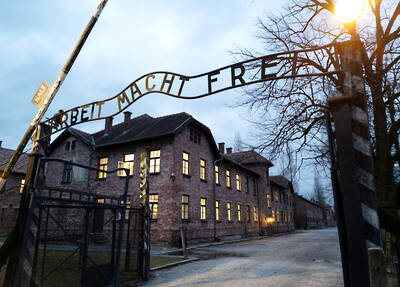It was meant as a jibe, but when a US senator recently branded French a "near forgotten" language he hit Gallic sensitivities right where they hurt most.
Yet instead of outraged denials, the remark has triggered soul-searching among French intellectuals who not only concede English's pre-eminence as world lingua franca but fear French is being shoved off the international scene altogether.
For a country which in the past has proclaimed its tongue the language of love, global diplomacy and the universal rights of man, that would be bad news.
"What is at stake is the survival of our culture. It is a life or death matter," Jacques Viot, head of the Alliance Francaise agency which promotes French abroad, told a public debate in Paris.
Reports of the imminent demise of the language are of course exaggerated. But the past decades have not been kind to French.
While French and English are the only two world languages with solid roots on five continents, the economic and political might of the US has propelled English into top place as the most prestigious language to have as a second tongue.
With its 80 million native practitioners, French is ranked 11th most spoken language in the world.
With the 180 million who count it as their second tongue, it comes in ninth. Altogether, a quarter of a billion have at least a smattering of French.
Shunned in Europe
In contrast, English is spoken as a first language by some 375 million and as a second language by roughly the same number.
According to figures used by the British government, a quarter of the world's population speak it with some level of competence.
English has long been the language of international trade and business. That trend is only being reinforced by the fact that it dominates some 80 percent of the Internet.
Even at havens of multi-culturalism such as the UN -- where French is one of the official working languages -- French diplomats are seeing an inexorable decline in its use in both formal and back-room dealings.
The situation is no better within the confines of Europe.
Visitors who click on the French icon of the Frankfurt-based European Central Bank's Web site are advised that the bulk of the site is in English and that they should perhaps try the Bank of France's home page for information in French.
Recent meetings in Brussels to draft a new constitution for the EU highlighted a future problem for French as negotiators sent by east European countries -- to be EU members as of next year -- almost unanimously favored using English.
It is calculated that their participation at EU meetings will require sufficient interpreters to cover 420 combinations of 20 or 21 languages. The fear niggling the French is that, in the end, everyone might just give up and turn to English.
At the sharp end of EU affairs, this is already happening. French army generals leading the multinational EU peacekeeping mission in the Democratic Republic of Congo had no hesitation in naming English the working language of their Paris-based HQ.
Even in its own backyard, French has for years suffered rearguard attacks from franglais, the badly-digested chunks of English which the French often prefer over home-grown words.
English's ability to form compound words or phrases seems to give it the edge in naming certain concepts. In business, for example, it is just easier to talk about le cash-flow than la marge brute d'auto-financement.
After threatening briefly in 1994 to jail anyone using such examples as le weekend or le parking in advertising or the media, France now appears to have largely given up the unequal fight against the franglais plague.
French CNN?
Yet if French is failing to assert itself, it is not through want of trying.
Few other countries have a four centuries-old institution like the Academie Francaise whose main duty is to act as linguistic watchdog, chiding bad French and approving good.
And few nations are so committed to furthering their culture that their cinema, literature, music and theatre enjoy state grants or other supports as generous as those in France.
"We have a plethora of means of protecting the language," insisted Bernard Cerquiglini, the head of the unit within France's Culture Ministry charged with promoting French.
"But language is living history. It reflects the balance of powers," he added, recognizing that the scales were currently tipped against French.
At no time was the supremacy of English as a proselytizing tool more painfully evident to France's leaders than during the Iraq war which they had unsuccessfully tried to prevent.
It was the reporters for the international English-language news channels CNN and BBC World whose pictures and dispatches from the front line helped form the global view of the war.
Now France has asked its media companies to come up with proposals for a French-language global news channel -- a CNN a la francaise idea floated by President Jacques Chirac to ensure France's voice continues to be heard in the world.
"A language is more than a way of speaking," said Jean-Marie Cavada, president of state-owned broadcaster Radio-France.
"It is a weapon of battle, an indispensable tool for any great country."

A jumbo operation is moving 20 elephants across the breadth of India to the mammoth private zoo set up by the son of Asia’s richest man, adjoining a sprawling oil refinery. The elephants have been “freed from the exploitative logging industry,” according to the Vantara Animal Rescue Centre, run by Anant Ambani, son of the billionaire head of Reliance Industries Mukesh Ambani, a close ally of Prime Minister Narendra Modi. The sheer scale of the self-declared “world’s biggest wild animal rescue center” has raised eyebrows — including more than 50 bears, 160 tigers, 200 lions, 250 leopards and 900 crocodiles, according to

They were four years old, 15 or only seven months when they were sent to Auschwitz-Birkenau, Bergen-Belsen, Buchenwald and Ravensbruck. Some were born there. Somehow they survived, began their lives again and had children, grandchildren and even great grandchildren themselves. Now in the evening of their lives, some 40 survivors of the Nazi camps tell their story as the world marks the 80th anniversary of the liberation of Auschwitz-Birkenau, the most notorious of the death camps. In 15 countries, from Israel to Poland, Russia to Argentina, Canada to South Africa, they spoke of victory over absolute evil. Some spoke publicly for the first